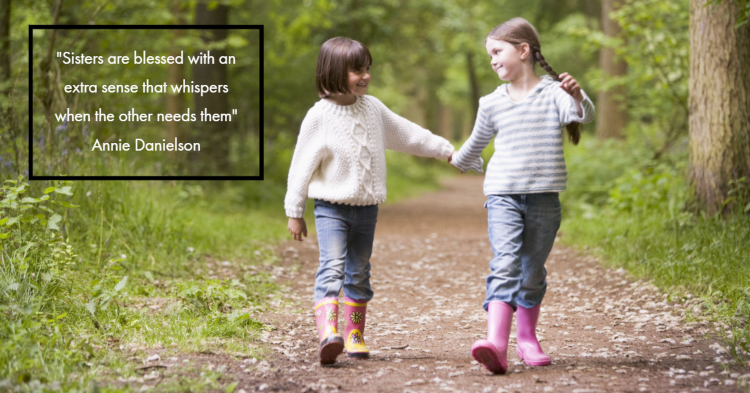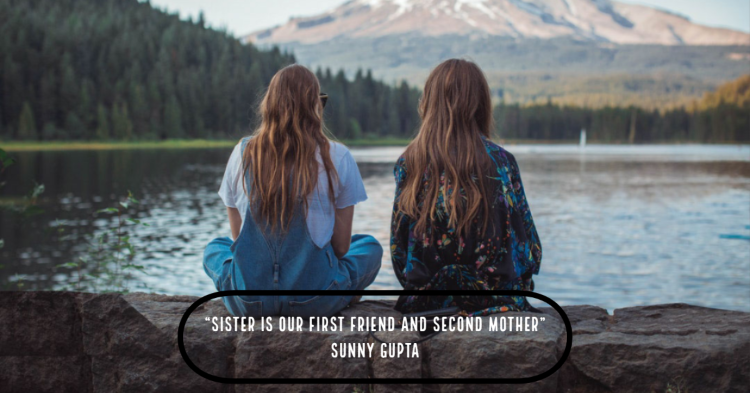Sister Relationships Shape Healthy Sexual Development
Sister relationships are understudied in psychology, despite the self-evident importance of such relationships. Siblings have unique relationships. They are like a combination between a parent-child relationship and a close friendship.
Sister Relationships
Like a parent-child relationship, they are involuntary yet close. Initially, in childhood, they can be hierarchical, with the older sibling having the authority. However, unlike a parent-child relationship, they become more egalitarian in adolescence.

Like a close friendship, they are close, allowing for unique, reflective communication. But, unlike a close friendship, they are involuntary, therefore allowing for more honest, judgemental communication that might sever a voluntary friendship.
Hence, sister relationships are unique and long-lasting. Sisters tend to have better relationships than with their brothers, in the form of greater support and intimacy. Sisters offer more advice to one another and are more influential than their brothers. Furthermore, sisters tend to be more honest with one another than brother-brother and brother-sister relationships.
Symbolic Interactionism Theory
New research from the Journal of Personal and Social Relationships has found that sisters are incredibly influential towards each other’s romantic lives and sexual development, particularly in adolescence.
The research works off the symbolic interactionism theory. This posits that communication about sex transmits values and attitudes from one person to another.
For example, symbolic interactionism involves the teenage girl’s attempt to create meaning in their life. Interactions with her sister modify and influence how she constructs that meaning. During conversations, both sisters reflect on their own experiences and attitudes, which creates their individual meaning.

Repeated conversations will eventually shape that girl’s sexual identity. She’ll learn how to act in a relationship, develop her sexuality and discover the behaviours and information associated with romance and sex.
The new research examines the content of sisters’ messages to one another regarding dating and sex, then corresponds them to real-life relationship and sexual behaviours and outcomes. The findings demonstrate how exactly sisters influence and develop each other’s relationships and sexuality.
Dating Logistics and Partners
During their conversations, sisters discussed dating logistics, dating partners, sex, and the importance of the self. Messages about dating logistics and dating partners were the most frequent.
Regarding dating logistics, sisters spoke about the timing or progression of relationships, including the pressure felt to begin dating in their senior years of schooling.
They discussed the qualities of relationships and romantic behaviours, such as affection, boundaries and trust. They talked about their values and opinions on relationships, like the idealised romantic relationship, and the definition of dating.
[perfectpullquote align=”full” bordertop=”false” cite=”” link=”” color=”#4AC1A8″ class=”” size=””]A younger sister (age 15) is reflecting on qualities of romantic relationships and her own experiences: “If you don’t have trust then I guess you don’t really have a relationship. Cause it’s hard for me to trust people. And sometimes it’s hard for guys to trust girls if they hurt them.”[/perfectpullquote]
When discussing dating partners, the key topics were how to find a romantic partner and their opinions on guys. Importantly, sisters mainly focused on developing healthy relationships and being smart when picking a dating partner.

A key theme of discussion was the importance of a good “fit” between partners.
[perfectpullquote align=”full” bordertop=”false” cite=”” link=”” color=”#4AC1A8″ class=”” size=””]For instance, an older sister (age 19) told her younger sister: “Find someone who’s like you. I think it comes down to your values being the same. If we didn’t agree about religious or political things…I couldn’t do that. I’m pretty outspoken about that kind of stuff and so if you can’t take me being outspoken about it and be outspoken with me, we have an issue.”[/perfectpullquote]
Sisters intuitively know what qualities characterise a healthy relationship. Prominent features of their discussions were open communication, appropriate boundaries, trust, and honesty.
The findings show that sisters relationships are an important source of support and wisdom. Conversations centred on the costs of dating, including negative effects on friendships and academic achievement.
Importantly, a teenage breakup is associated with negative adjustment, including increased depressive symptoms and greater substance abuse. The support of sisters may be invaluable during such periods.
Sisters and Sex
Discussions on sex were characterised by a caretaking relationship. Older sisters warned their younger sisters about the dangers of unsafe sex, encouraging them to take preventative measures such as using condoms or the birth control pill.
These discussions are associated with increased condom use among younger sisters. Older sisters tended to discourage their younger sisters from having sex before the relationship was committed and intimate.
[perfectpullquote align=”full” bordertop=”false” cite=”” link=”” color=”#4AC1A8″ class=”” size=””] Older sister (age 15): “Being pregnant in high school takes away everything. You gotta keep in mind like, mom and dad would pay for the baby obviously, but they’re not gonna buy daycare. You’re just gonna stop going to school and go home. And it’s literally just throwing your life away.”
Younger sister (age 12): “It’s gonna be terrible.”
Older sister: “Not to mention all the STDs that are going around. That’s disgusting.”[/perfectpullquote]
Interestingly, they did not discuss the positive aspects of sex, such as physical satisfaction and increased intimacy with sexual partners. The researchers posit that this is a protective measure employed to delay their younger sisters from engaging in premature sexual activity.
Sisters and Self
Another key topic was the importance of balancing a relationship with friendships and schoolwork. Based on their own experiences, young women told their sisters not to become overinvolved with relationships.

[perfectpullquote align=”full” bordertop=”false” cite=”” link=”” color=”#4AC1A8″ class=”” size=””] An older sister (age 20) said: “It’s important to be independent because you need to know what you want to do and it shouldn’t be dictated by what your boyfriend wants to do or like you should make your own decisions.” [/perfectpullquote]
Previous research has shown that such overinvolvement can lead to a decline in academic performance and cause more interpersonal conflict with friends and family.
As adolescent relationships are common and important for personal development, the advice offered by older sisters on the importance of balance is invaluable to healthy growth into adulthood.
Different Sisters, Different Advice
Older sisters differed in their advice offerings based on their own behaviours and attitudes. If an older sister planned on having more sex, then the messages centred on sexual advice.
Conversely, if an older sister was more conservative and less promiscuous, then they had less discussions regarding dating logistics. Younger sisters were less likely to ask for such advice in these cases.
If older sisters had had sex, their younger sisters were more likely to bring sex up as a conversation topic. When older sisters had intentions to have sex within the next year, younger sisters asked for advice on dating partners.
The Importance of Sister Relationships
Overall, the findings indicate that sister relationships play an important role in healthy adolescent sexual development and romantic life. They offer invaluable life advice that encourages safe sex, defines suitable partners, emphasises the importance of balance and ensures that their younger sisters live their best lives.
[perfectpullquote align=”full” bordertop=”false” cite=”” link=”” color=”#4AC1A8″ class=”” size=””]Suggested Reading: Practical Psychology | Parents Change Children’s Personality[/perfectpullquote]
